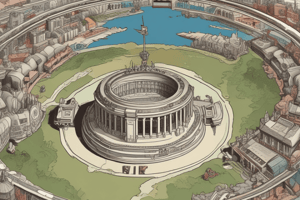Podcast
Questions and Answers
What are the key characteristics of a direct democracy, and how does it differ from an indirect democracy?
What are the key characteristics of a direct democracy, and how does it differ from an indirect democracy?
A direct democracy gives everyone decision-making power, where every citizen gets a vote on every major decision. It works best for small groups and requires citizens to agree to follow the decision with the most votes. In contrast, an indirect democracy, also known as a representative democracy, elects a few individuals to represent citizens as groups, trusting them to make decisions in their best interests.
What is the main difference between an absolute monarchy and a constitutional monarchy?
What is the main difference between an absolute monarchy and a constitutional monarchy?
In an absolute monarchy, the monarch has absolute power and rules for life, whereas in a constitutional monarchy, the monarch's power is limited by a constitution and laws.
What are the key characteristics of a technocracy, and how does it differ from other forms of government?
What are the key characteristics of a technocracy, and how does it differ from other forms of government?
A technocracy is a government where decision-makers are chosen based on their technical expertise and background. This form of government is distinct from others, as it prioritizes knowledge and expertise over wealth, power, or popularity.
What is the primary difference between an autocracy and a dictatorship?
What is the primary difference between an autocracy and a dictatorship?
How does a plutocracy differ from other forms of government, and what are some historical examples of plutocratic systems?
How does a plutocracy differ from other forms of government, and what are some historical examples of plutocratic systems?
What is the main characteristic of a federal system of government?
What is the main characteristic of a federal system of government?
What is the primary difference between left and right political ideologies regarding government involvement in the economy?
What is the primary difference between left and right political ideologies regarding government involvement in the economy?
How do the horizontal and vertical axes of the political spectrum diagram relate to individual freedoms and government control?
How do the horizontal and vertical axes of the political spectrum diagram relate to individual freedoms and government control?
What are the extreme ideologies associated with the top and bottom of the political spectrum diagram?
What are the extreme ideologies associated with the top and bottom of the political spectrum diagram?
How do communist and fascist ideologies differ in their placement on the political spectrum?
How do communist and fascist ideologies differ in their placement on the political spectrum?
Flashcards are hidden until you start studying
Study Notes
Forms of Government
- A government organizes people, makes laws, and protects their property and rights.
- Types of government include democracy, autocracy, monarchy, dictatorship, anarchy, theocracy, technocracy, and plutocracy.
Democracy
- Gives everyone decision-making power, either directly or indirectly.
- Direct democracy: everyone votes on every major decision, suitable for small groups.
- Indirect democracy: representative democracy, where elected representatives make decisions on behalf of the people.
Autocracy
- One person has all the power, making all decisions.
- Monarchy is a type of autocratic government, where a king or queen rules for life with absolute power.
Autocratic Subtypes
- Absolute monarchy: a single ruler with absolute power.
- Constitutional monarchy: the monarch's power is limited by a constitution and laws.
- Dictatorship: a ruler has absolute power, often with the help of advisers, and seeks power for life.
Anarchy
- A condition of lawlessness or political disorder due to the absence of governmental authority.
Theocracy
- A government where a God or deity is recognized as the supreme civil ruler.
- Laws are interpreted by religious authorities, with the government subject to religious authority.
Technocracy
- People with technical expertise are in charge, making decisions based on their knowledge and background.
Plutocracy
- A government where people with wealth are in charge, with the wealthy governing the country.
Federation
- A union of self-governing states or regions, joined together under a central government.
Political Spectrum
- Left: big government, high tax, liberal and progressive, with a focus on equality and community-based ethics.
- Right: small government, low tax, conservative and traditional, with a focus on freedom and community-based morals.
Dimensions of Political Spectrum
- Horizontal axis: government involvement in the economy, with left favoring more intervention and right favoring less.
- Vertical axis: individual rights and freedoms, with libertarians at the bottom and collectivists at the top.
- The graph represents a 2-dimensional spectrum, with individuals positioned everywhere between the extremes.
Studying That Suits You
Use AI to generate personalized quizzes and flashcards to suit your learning preferences.




